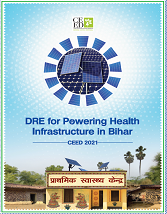
Undertaken By: Centre for Environment and Energy Development, Recent Publication: 2021
The impacts of COVID-19 on the health, economic, and humanitarian fronts were felt deeply all across the country. According to a survey by the Centre for Monitoring Indian Economy (CMIE), Bihar was one of the states that faced the worst impacts of the COVID-19 induced lockdown. In the wake of pandemic, more than 1.5 million migrant workers have returned to the state and Bihar now faces the task of restarting the local economy and managing the fallout from the loss of repatriated income, while constructively engaging the unemployed but skilled and semi-skilled workforce now available in the state.
The health sector in Bihar is facing a massive crisis owing to various factors including a shortage of human resources, low public spending and intermittent electricity supply which impacts the delivery of services.
This initiative aims highlight the value in adopting and scaling DRE-based solutions in Bihar for not only improving the quality of electricity supply but also increasing incomes through improved production yield, access to quality health care, leading to an overall improvement living standard. DRE-based solutions have a lot of value to offer, especially in Bihar, where the advantages of DRE have already been experienced. In 2017-18, the decentralised renewable energy (DRE) sector employed 95,000 people, with most of the jobs coming from companies selling pico solar appliances, solar home systems, green mini-grids and productive use systems such as solar water pumps. DRE-based interventions in the healthcare space can have positive impacts for the sector by providing access to reliable electricity, thereby improving delivery of services, especially in rural areas where the healthcare infrastructure requires more support.